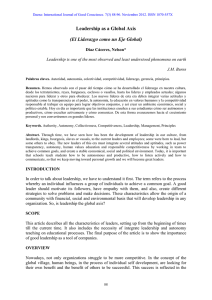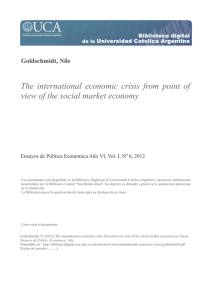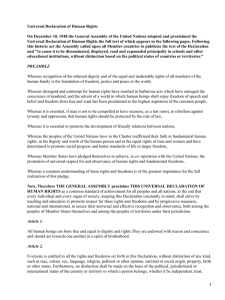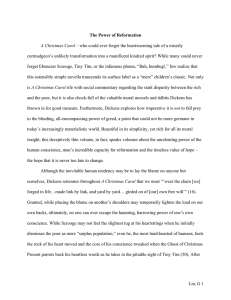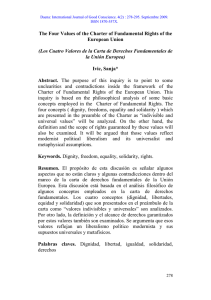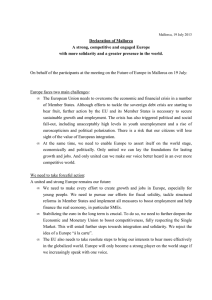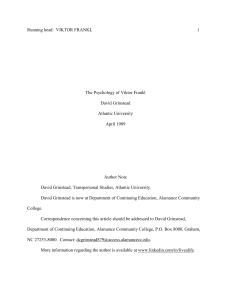European Charter for Secularism and Freedom of Conscience
Anuncio
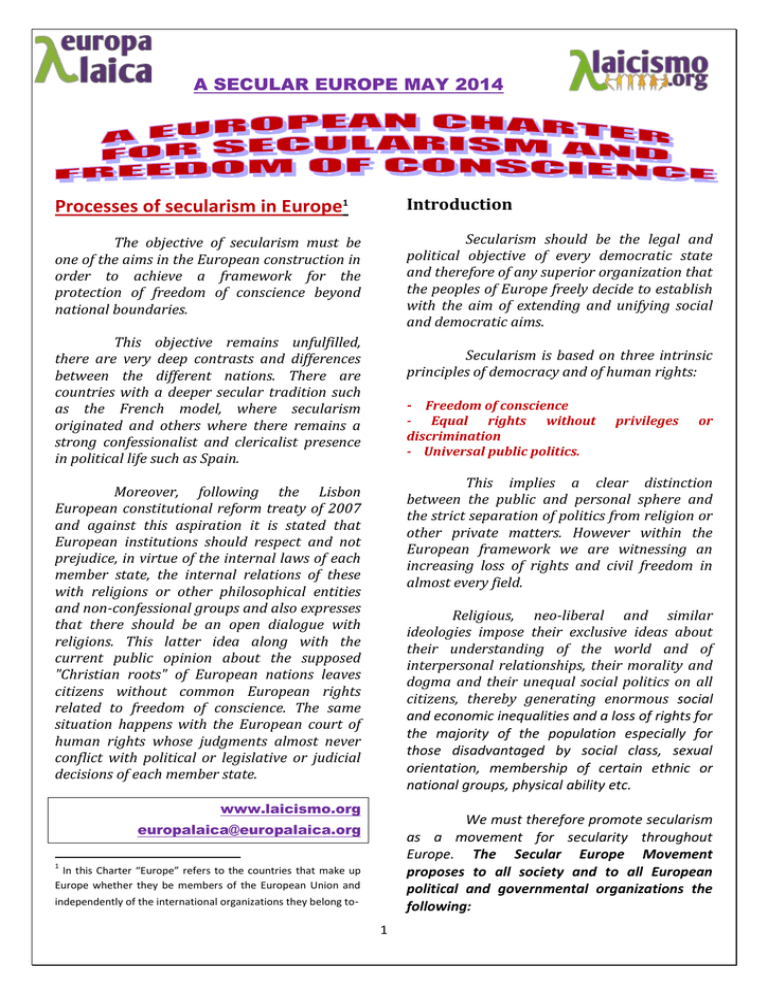
A SECULAR EUROPE MAY 2014 Processes of secularism in Europe1 Introduction The objective of secularism must be one of the aims in the European construction in order to achieve a framework for the protection of freedom of conscience beyond national boundaries. Secularism should be the legal and political objective of every democratic state and therefore of any superior organization that the peoples of Europe freely decide to establish with the aim of extending and unifying social and democratic aims. This objective remains unfulfilled, there are very deep contrasts and differences between the different nations. There are countries with a deeper secular tradition such as the French model, where secularism originated and others where there remains a strong confessionalist and clericalist presence in political life such as Spain. Secularism is based on three intrinsic principles of democracy and of human rights: - Freedom of conscience - Equal rights without discrimination - Universal public politics. privileges or This implies a clear distinction between the public and personal sphere and the strict separation of politics from religion or other private matters. However within the European framework we are witnessing an increasing loss of rights and civil freedom in almost every field. Moreover, following the Lisbon European constitutional reform treaty of 2007 and against this aspiration it is stated that European institutions should respect and not prejudice, in virtue of the internal laws of each member state, the internal relations of these with religions or other philosophical entities and non-confessional groups and also expresses that there should be an open dialogue with religions. This latter idea along with the current public opinion about the supposed "Christian roots" of European nations leaves citizens without common European rights related to freedom of conscience. The same situation happens with the European court of human rights whose judgments almost never conflict with political or legislative or judicial decisions of each member state. Religious, neo-liberal and similar ideologies impose their exclusive ideas about their understanding of the world and of interpersonal relationships, their morality and dogma and their unequal social politics on all citizens, thereby generating enormous social and economic inequalities and a loss of rights for the majority of the population especially for those disadvantaged by social class, sexual orientation, membership of certain ethnic or national groups, physical ability etc. www.laicismo.org We must therefore promote secularism as a movement for secularity throughout Europe. The Secular Europe Movement proposes to all society and to all European political and governmental organizations the following: [email protected] 1 In this Charter “Europe” refers to the countries that make up Europe whether they be members of the European Union and independently of the international organizations they belong to- 1 A EUROPEAN CHARTER FOR SECULARISM AND FREEDOM OF CONSCIENCE 1. Freedom of conscience It must be a priority for the institutions of the member states to promote and guarantee full freedom of conscience, of thought and of expression for everyone regardless of their nationality. Furthermore member states should respect the strict separation between the State and religious or personal beliefs. 2. No censorship for reasons of dogma Civic, judicial, political, cultural and social structures must be organized to respect individual and collective freedoms associated with the general interest and to the benefit of all public goods without individual dogmatic interests be they religious or not affecting all citizens Freedom of expression (in all its forms artistic, intellectual…) is to be guaranteed without any State, pressure groups, be they confessional or related to a ideological group or organization, being able to limit it in the name of prohibitions which only affect members of that group. The implementation of advances obtained through scientific and technological research should enjoy complete freedom only taking into consideration the framework of civil laws voted in by democratically elected and legally responsible entities provided that these are not the product of interference from religious and other ideological groups. Opinions (or prohibitions) of a religious type must not be taken into consideration in European legislation when it implies any elements of discrimination or privilege against the principles of secularism. The member states should also guarantee freedom of conscience so that no person is subjected to medical treatment against their will or to suffer unnecessary or degrading practices, always respecting the right of each individual to die with dignity by legalizing the right to euthanasia and assisted suicide. 3. The independence of States in relation to churches and religions European institutions should ensure their absolute independence in relation to religious confessions, to clerics and to their confessional interests. States should eliminate and avoid any type of agreements or pacts with religious confessions to avoid placing limits on freedom of conscience or interference in common civil law for all citizens. Civic, social, cultural and educational responsibilities derived from European politics shall be carried out by the corresponding public services and shall not be put in the hands of private entities including those dependent on religious confessions. As regards religious practice, the exercise of these legitimate rights (individual and collective) shall be guaranteed within the framework of the private sphere from where it emanates without it ever interfering with the public and political domain. Different confessions shall not be financed by the state. Furthermore the tax treatment of religious entities must be harmonized to eliminate all tax exemptions and benefits which they enjoy. In any case, until the complete financial independence and removal of all financial privileges is complete, there will be a public and transparent control on the part of governments of the financing awarded in its different forms to religious bodies. Religious bodies must be regulated by private law and as such should not be treated as public entities in this respect the law regulating the crime of blasphemy should disappear from judicial regulations throughout Europe. Religious symbols or of other private ideologies must not be present in official acts of a public nature or in public buildings in any European state. The presence of political representatives or those holding public office in that capacity should cease for all liturgical and confessional religious acts or of other private ideology and also their intrusion of religious ceremonies in civil acts. No European State or public institution shall recognize the Vatican or the Holy See as a State and therefore shall not maintain diplomatic relations, nor shall they maintain relations in the framework of the United Nations or its international organizations. 2 4. Women's rights Women’s rights and equality to participate in political and social life are to be guaranteed, without ambiguity. No limitation due to specifications related to membership of a confessional or ethnic group or of a particular community or organization shall be taken into consideration by European laws or those of its member States. The freedom of conscience for women to exercise their right to motherhood or the termination of pregnancy, within the framework of their sexual and reproductive rights, must be upheld in all European countries so that these rights may be exercised freely and in the public health sector. All European countries shall prohibit all forms of violence against women and shall undertake to develop a worldwide campaign against such practices. 5. Children’s and adolescents’ rights Freedom of conscience among children and adolescents shall be specifically protected regardless of the ideological convictions of parents and care-takers. European laws shall consider children and adolescents as free citizens and therefore shall ensure their freedom from any coercive doctrinal or dogmatic conditioning, including sexual mutilations based on religious or supposedly cultural pretexts and from the imposition by adults of any religion, rite or ideological conviction. Child labour shall be prohibited and this prohibition shall extend to European companies and corporations that possess factories and workplaces outside Europe and measures shall be taken against child labour in other countries. 6. Public, secular Education in Europe All European counties shall guarantee their citizens a public, democratic and secular education system, directed towards the development of the personality, freedom of conscience, equality and full citizenship through curricular content based on universal, scientific, artistic and humanistic values and excluding the presence of religious indoctrination in the curricula or symbols displayed in schools. 7. Rights of Migrants Persons displaced from other countries to any European country for social, economic or political motives shall enjoy the same rights, obligations and freedoms as the citizens of the host country. European law shall always prevail in terms of rights and freedoms over the national legislations of the countries of origin that limit or infringe such rights. 8. Mutual respect and identity of rights and obligations European institutions must allow and encourage the practice of mutual respect in relation to the ethno-cultural differences within a framework of a complete identity of rights and obligations for all citizens. They must exclude all tolerance for racist or segregationist forces, both within political, private and social life. They must respect the fundamental principle that the legitimate right to difference cannot justify an inacceptable difference in rights. 9. Solidarity among peoples The International European Institutions and other bodies of the European Union shall urge national governments to carry out actions of solidarity among peoples especially with States with higher levels of poverty and social exclusion. This solidarity should seek to achieve solutions of social justice in a very broad framework, without which there is no possibility of economic development or the development of social rights and freedoms. 3 10. The free the diffusion and dissemination of secular values. European institutions shall promote and ensure the secular nature of all norms and recommendations that they issue. They shall strictly respect institutional secularism and shall promote and facilitate its dissemination with a view to working towards the common good and social cohesion, urging all European states to ensure that their constitutions and other national laws be based on secular principles. Where appropriate, they shall urge that such principles may be disseminated without any let or hindrance in any member state. 11. Secularism, a guarantee of civil peace and harmony for Europe The philosophical, ethical, moral, democratic and civil values on which secularism is founded make it acceptable for all minds imbued with a sense freedom, mutual respect and justice. It has a universal vocation as it proposes positive, expedient solutions to many social and civic problems faced in most European countries and around the world. This also implies the principles of universal justice and the pursuit of crimes against humanity by national and European judiciary institutions even those committed beyond their borders. Consequently it is essential and in the general interest of individuals, social groups and national communities that secularism should be taken into consideration and encouraged within Europe and in its foreign policy and that it should serve as a basis to achieve a citizenship that exercises solidarity. CONCRETE DEMANDS FOR SECULARISM AND FREEDOM OF CONSCIENCE IN EUROPE From the ideas expressed in this Charter for Secularism and Freedom of Conscience, the following concrete demands follow as minimum demands for secularism in Europe: FREEDOM The full recognition of and maximum guarantees for the freedom of conscience, thought and speech. The abolition of all crimes of blasphemy. The strict separation of states and public institutions, on the one hand, and religious faiths. The inclusion of secular principles in national and European legislations The recognition of religious entities in Private Law at the same level as any other association, The elimination of all the Concordats with the Catholic Church and any other Treaty or Agreement with any religious faith on the part of any State or European institution. The elimination of all public funding and tax privileges of religions. The establishment of a secular statute for all those in public office and for public spaces so as to avoid the presence of public representatives in religious acts and the presence of religious symbols in the public sphere. No political recognition of the Vatican as a State in the international community. A guarantee of freedom to express secular ideas and principles and participation channels of secular organizations with institutions in those themes that directly affect them. The Creation of a European Observatory of Secularism EQUALITY A guarantee for all European citizens of a public, inclusive, universal, democratic and secular educational system free of charge. A prohibition of any form of discrimination for any type of physical, intellectual, socio-economic, reason and any form of discrimination related to gender, sexual orientation, ethnic origin, nationality or any other condition. A respect for the autonomy of the patient and recognition of the right to euthanasia and assisted suicide. Full equality of rights between men and women. Recognition of and guarantees for the right to free termination of pregnancy. A prohibition of any type of violence against women. A recognition and protection of the rights of children and adolescents, their freedom of conscience and their right not to be indoctrinated in the family or school environment. A prohibition of child labour. Equal rights for migrants and precedence of European Law regarding rights and freedoms over their home country’s national legislation. A prohibition and the pursuit of all forms of racism, segregationism and discrimination. SOLIDARITY Direct and public provision of public services without religious or private interference. Active public policies to combat poverty and social exclusion A foreign policy based on peace, solidarity and cooperation among peoples. 4
